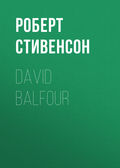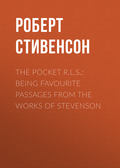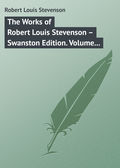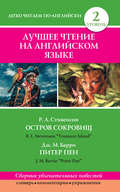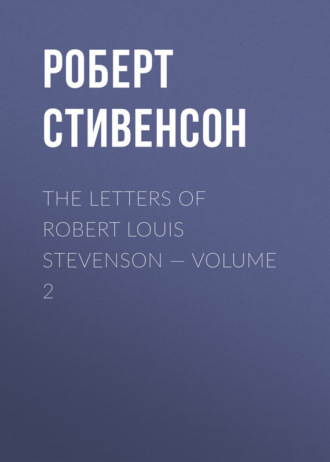
Роберт Льюис Стивенсон
The Letters of Robert Louis Stevenson — Volume 2
R. L. S.
Letter: TO T. WATTS-DUNTON
SKERRYVORE, BOURNEMOUTH [SEPTEMBER 1886]
DEAR MR. WATTS, The sight of the last ATHENAEUM reminds me of you, and of my debt, now too long due. I wish to thank you for your notice of KIDNAPPED; and that not because it was kind, though for that also I valued it, but in the same sense as I have thanked you before now for a hundred articles on a hundred different writers. A critic like you is one who fights the good fight, contending with stupidity, and I would fain hope not all in vain; in my own case, for instance, surely not in vain.
What you say of the two parts in KIDNAPPED was felt by no one more painfully than by myself. I began it partly as a lark, partly as a pot-boiler; and suddenly it moved, David and Alan stepped out from the canvas, and I found I was in another world. But there was the cursed beginning, and a cursed end must be appended; and our old friend Byles the butcher was plainly audible tapping at the back door. So it had to go into the world, one part (as it does seem to me) alive, one part merely galvanised: no work, only an essay. For a man of tentative method, and weak health, and a scarcity of private means, and not too much of that frugality which is the artist's proper virtue, the days of sinecures and patrons look very golden: the days of professional literature very hard. Yet I do not so far deceive myself as to think I should change my character by changing my epoch; the sum of virtue in our books is in a relation of equality to the sum of virtues in ourselves; and my KIDNAPPED was doomed, while still in the womb and while I was yet in the cradle, to be the thing it is.
And now to the more genial business of defence. You attack my fight on board the COVENANT: I think it literal. David and Alan had every advantage on their side — position, arms, training, a good conscience; a handful of merchant sailors, not well led in the first attack, not led at all in the second, could only by an accident have taken the round-house by attack; and since the defenders had firearms and food, it is even doubtful if they could have been starved out. The only doubtful point with me is whether the seamen would have ever ventured on the second onslaught; I half believe they would not; still the illusion of numbers and the authority of Hoseason would perhaps stretch far enough to justify the extremity. — I am, dear Mr. Watts, your very sincere admirer,
ROBERT LOUIS STEVENSON.
Letter: TO FREDERICK LOCKER-LAMPSON
SKERRYVORE, SEPTEMBER 4, 1886
NOT roses to the rose, I trow,
The thistle sends, nor to the bee
Do wasps bring honey. Wherefore now
Should Locker ask a verse from me?
Martial, perchance, — but he is dead,
And Herrick now must rhyme no more;
Still burning with the muse, they tread
(And arm in arm) the shadowy shore.
They, if they lived, with dainty hand,
To music as of mountain brooks,
Might bring you worthy words to stand
Unshamed, dear Locker, in your books.
But tho' these fathers of your race
Be gone before, yourself a sire,
To-day you see before your face
Your stalwart youngsters touch the lyre -
On these — on Lang, or Dobson — call,
Long leaders of the songful feast.
They lend a verse your laughing fall -
A verse they owe you at the least.
Letter: TO FREDERICK LOCKER-LAMPSON
[SKERRYVORE], BOURNEMOUTH, SEPTEMBER 1886
DEAR LOCKER, — You take my verses too kindly, but you will admit, for such a bluebottle of a versifier to enter the house of Gertrude, where her necklace hangs, was not a little brave. Your kind invitation, I fear, must remain unaccented; and yet — if I am very well — perhaps next spring — (for I mean to be very well) — my wife might... But all that is in the clouds with my better health. And now look here: you are a rich man and know many people, therefore perhaps some of the Governors of Christ's Hospital. If you do, I know a most deserving case, in which I would (if I could) do anything. To approach you, in this way, is not decent; and you may therefore judge by my doing it, how near this matter lies to my heart. I enclose you a list of the Governors, which I beg you to return, whether or not you shall be able to do anything to help me.
The boy's name is — ; he and his mother are very poor. It may interest you in her cause if I tell you this: that when I was dangerously ill at Hyeres, this brave lady, who had then a sick husband of her own (since dead) and a house to keep and a family of four to cook for, all with her own hands, for they could afford no servant, yet took watch-about with my wife, and contributed not only to my comfort, but to my recovery in a degree that I am not able to limit. You can conceive how much I suffer from my impotence to help her, and indeed I have already shown myself a thankless friend. Let not my cry go up before you in vain! — Yours in hope,
ROBERT LOUIS STEVENSON.
Letter: TO FREDERICK LOCKER-LAMPSON
SKERRYVORE, BOURNEMOUTH, SEPTEMBER 1886
MY DEAR LOCKER, — That I should call myself a man of letters, and land myself in such unfathomable ambiguities! No, my dear Locker, I did not want a cheque; and in my ignorance of business, which is greater even than my ignorance of literature, I have taken the liberty of drawing a pen through the document and returning it; should this be against the laws of God or man, forgive me. All that I meant by my excessively disgusting reference to your material well-being was the vague notion that a man who is well off was sure to know a Governor of Christ's Hospital; though how I quite arrived at this conclusion I do not see. A man with a cold in the head does not necessarily know a ratcatcher; and the connection is equally close — as it now appears to my awakened and somewhat humbled spirit. For all that, let me thank you in the warmest manner for your friendly readiness to contribute. You say you have hopes of becoming a miser: I wish I had; but indeed I believe you deceive yourself, and are as far from it as ever. I wish I had any excuse to keep your cheque, for it is much more elegant to receive than to return; but I have my way of making it up to you, and I do sincerely beg you to write to the two Governors. This extraordinary outpouring of correspondence would (if you knew my habits) convince you of my great eagerness in this matter. I would promise gratitude; but I have made a promise to myself to make no more promises to anybody else, having broken such a host already, and come near breaking my heart in consequence; and as for gratitude, I am by nature a thankless dog, and was spoiled from a child up. But if you can help this lady in the matter of the Hospital, you will have helped the worthy. Let me continue to hope that I shall make out my visit in the spring, and believe me, yours very truly,
ROBERT LOUIS STEVENSON.
It may amuse you to know that a very long while ago, I broke my heart to try to imitate your verses, and failed hopelessly. I saw some of the evidences the other day among my papers, and blushed to the heels.
R. L. S.
I give up finding out your name in the meantime, and keep to that by which you will be known — Frederick Locker.
Letter: TO FREDERICK LOCKER-LAMPSON
[SKERRYVORE, BOURNEMOUTH], 24TH SEPTEMBER 1886
MY DEAR LOCKER, — You are simply an angel of light, and your two letters have gone to the post; I trust they will reach the hearts of the recipients — at least, that could not be more handsomely expressed. About the cheque: well now, I am going to keep it; but I assure you Mrs. — has never asked me for money, and I would not dare to offer any till she did. For all that I shall stick to the cheque now, and act to that amount as your almoner. In this way I reward myself for the ambiguity of my epistolary style.
I suppose, if you please, you may say your verses are thin (would you so describe an arrow, by the way, and one that struck the gold? It scarce strikes me as exhaustively descriptive), and, thin or not, they are (and I have found them) inimitably elegant. I thank you again very sincerely for the generous trouble you have taken in this matter which was so near my heart, and you may be very certain it will be the fault of my health and not my inclination, if I do not see you before very long; for all that has past has made me in more than the official sense sincerely yours,
ROBERT LOUIS STEVENSON.
Letter: TO SIDNEY COLVIN
SKERRYVORE, DEC. 14, 1886
MY DEAR COLVIN, — This is first-rate of you, the Lord love you for it! I am truly much obliged. He — my father — is very changeable; at times, he seems only a slow quiet edition of himself; again, he will be very heavy and blank; but never so violent as last spring; and therefore, to my mind, better on the whole.
Fanny is pretty peepy; I am splendid. I have been writing much verse — quite the bard, in fact; and also a dam tale to order, which will be what it will be: I don't love it, but some of it is passable in its mouldy way, THE MISADVENTURES OF JOHN NICHOLSON. All my bardly exercises are in Scotch; I have struck my somewhat ponderous guitar in that tongue to no small extent: with what success, I know not, but I think it's better than my English verse; more marrow and fatness, and more ruggedness.
How goes KEATS? Pray remark, if he (Keats) hung back from Shelley, it was not to be wondered at, WHEN SO MANY OF HIS FRIENDS WERE SHELLEY'S PENSIONERS. I forget if you have made this point; it has been borne in upon me reading Dowden and the SHELLEY PAPERS; and it will do no harm if you have made it. I finished a poem to-day, and writ 3000 words of a story, TANT BIEN QUE MAL; and have a right to be sleepy, and (what is far nobler and rarer) am so. — My dear Colvin, ever yours,
THE REAL MACKAY.
Letter: TO FREDERICK LOCKER-LAMPSON
SKERRYVORE, BOURNEMOUTH, FEBRUARY 5TH, 1887
MY DEAR LOCKER, — Here I am in my bed as usual, and it is indeed a long while since I went out to dinner. You do not know what a crazy fellow this is. My winter has not so far been luckily passed, and all hope of paying visits at Easter has vanished for twelve calendar months. But because I am a beastly and indurated invalid, I am not dead to human feelings; and I neither have forgotten you nor will forget you. Some day the wind may round to the right quarter and we may meet; till then I am still truly yours,
ROBERT LOUIS STEVENSON.
Letter: TO HENRY JAMES
[SKERRYVORE, BOURNEMOUTH, FEBRUARY 1887.]
MY DEAR JAMES, — My health has played me it in once more in the absurdest fashion, and the creature who now addresses you is but a stringy and white-faced BOUILLI out of the pot of fever, with the devil to pay in every corner of his economy. I suppose (to judge by your letter) I need not send you these sheets, which came during my collapse by the rush. I am on the start with three volumes, that one of tales, a second one of essays, and one of — ahem — verse. This is a great order, is it not? After that I shall have empty lockers. All new work stands still; I was getting on well with Jenkin when this blessed malady unhorsed me, and sent me back to the dung-collecting trade of the republisher. I shall re-issue VIRG. PUER. as Vol. I. of ESSAYS, and the new vol. as Vol. II. of ditto; to be sold, however, separately. This is but a dry maundering; however, I am quite unfit — 'I am for action quite unfit Either of exercise or wit.' My father is in a variable state; many sorrows and perplexities environ the house of Stevenson; my mother shoots north at this hour on business of a distinctly rancid character; my father (under my wife's tutorage) proceeds to-morrow to Salisbury; I remain here in my bed and whistle; in no quarter of heaven is anything encouraging apparent, except that the good Colvin comes to the hotel here on a visit. This dreary view of life is somewhat blackened by the fact that my head aches, which I always regard as a liberty on the part of the powers that be. This is also my first letter since my recovery. God speed your laudatory pen!
My wife joins in all warm messages. — Yours,
R. L. S.
Letter: TO W. H. LOW
(APRIL 1887.)
MY DEAR LOW, — The fares to London may be found in any continental Bradshaw or sich; from London to Bournemouth impoverished parties who can stoop to the third class get their ticket for the matter of 10s., or, as my wife loves to phrase it, 'a half a pound.' You will also be involved in a 3s. fare to get to Skerryvore; but this, I dare say, friends could help you in on your arrival; so that you may reserve your energies for the two tickets — costing the matter of a pound — and the usual gratuities to porters. This does not seem to me much: considering the intellectual pleasures that await you here, I call it dirt cheap. I BELIEVE the third class from Paris to London (VIA Dover) is ABOUT forty francs, but I cannot swear. Suppose it to be fifty.
50x2=100
The expense of spirit or spontaneous lapse of coin on the journey, at 5 frcs. a head, 5x2=10
Victuals on ditto, at 5 frcs. a head, 5x2 = 10
Gratuity to stewardess, in case of severe prostration, at 3 francs
One night in London, on a modest footing, say 20
Two tickets to Bournemouth at 12.50, 12.50x2=25
Porters and general devilment, say 5
Cabs in London, say 2 shillings, and in Bournemouth, 3 shillings=5 shillings, 6 frcs. 25
Total frcs. 179.25
Or, the same in pounds, 7 pounds, 3s. 6 and a half d.
Or, the same in dollars, $35.45,
if there be any arithmetical virtue in me. I have left out dinner in London in case you want to blow out, which would come extry, and with the aid of VANGS FANGS might easily double the whole amount — above all if you have a few friends to meet you.
In making this valuable project, or budget, I discovered for the first time a reason (frequently overlooked) for the singular costliness of travelling with your wife. Anybody would count the tickets double; but how few would have remembered — or indeed has any one ever remembered? — to count the spontaneous lapse of coin double also? Yet there are two of you, each must do his daily leakage, and it must be done out of your travelling fund. You will tell me, perhaps, that you carry the coin yourself: my dear sir, do you think you can fool your Maker? Your wife has to lose her quota; and by God she will — if you kept the coin in a belt. One thing I have omitted: you will lose a certain amount on the exchange, but this even I cannot foresee, as it is one of the few things that vary with the way a man has. — I am, dear sir, yours financially,
SAMUEL BUDGETT.
Letter: TO ALISON CUNNINGHAM
SKERRYVORE, APRIL 16TH, 1887
MY DEAREST CUMMY, — As usual, I have been a dreary bad fellow and not written for ages; but you must just try to forgive me, to believe (what is the truth) that the number of my letters is no measure of the number of times I think of you, and to remember how much writing I have to do. The weather is bright, but still cold; and my father, I'm afraid, feels it sharply. He has had — still has, rather — a most obstinate jaundice, which has reduced him cruelly in strength, and really upset him altogether. I hope, or think, he is perhaps a little better; but he suffers much, cannot sleep at night, and gives John and my mother a severe life of it to wait upon him. My wife is, I think, a little better, but no great shakes. I keep mightily respectable myself.
Coolin's Tombstone is now built into the front wall of Skerryvore, and poor Bogie's (with a Latin inscription also) is set just above it. Poor, unhappy wee man, he died, as you must have heard, in fight, which was what he would have chosen; for military glory was more in his line than the domestic virtues. I believe this is about all my news, except that, as I write, there is a blackbird singing in our garden trees, as it were at Swanston. I would like fine to go up the burnside a bit, and sit by the pool and be young again — or no, be what I am still, only there instead of here, for just a little. Did you see that I had written about John Todd? In this month's LONGMAN it was; if you have not seen it, I will try and send it you. Some day climb as high as Halkerside for me (I am never likely to do it for myself), and sprinkle some of the well water on the turf. I am afraid it is a pagan rite, but quite harmless, and YE CAN SAIN IT WI' A BIT PRAYER. Tell the Peewies that I mind their forbears well. My heart is sometimes heavy, and sometimes glad to mind it all. But for what we have received, the Lord make us truly thankful. Don't forget to sprinkle the water, and do it in my name; I feel a childish eagerness in this.
Remember me most kindly to James, and with all sorts of love to yourself, believe me, your laddie,
ROBERT LOUIS STEVENSON.
P.S. — I suppose Mrs. Todd ought to see the paper about her man; judge of that, and if you think she would not dislike it, buy her one from me, and let me know. The article is called 'Pastoral,' in LONGMAN'S MAGAZINE for April. I will send you the money; I would to-day, but it's the Sabbie day, and I cannae.
R. L. S.
Remembrances from all here.
Letter: TO SIDNEY COLVIN
[EDINBURGH, JUNE 1887.]
MY DEAR S. C., — At last I can write a word to you. Your little note in the P. M. G. was charming. I have written four pages in the CONTEMPORARY, which Bunting found room for: they are not very good, but I shall do more for his memory in time.
About the death, I have long hesitated, I was long before I could tell my mind; and now I know it, and can but say that I am glad. If we could have had my father, that would have been a different thing. But to keep that changeling — suffering changeling — any longer, could better none and nothing. Now he rests; it is more significant, it is more like himself. He will begin to return to us in the course of time, as he was and as we loved him.
My favourite words in literature, my favourite scene — 'O let him pass,' Kent and Lear — was played for me here in the first moment of my return. I believe Shakespeare saw it with his own father. I had no words; but it was shocking to see. He died on his feet, you know; was on his feet the last day, knowing nobody — still he would be up. This was his constant wish; also that he might smoke a pipe on his last day. The funeral would have pleased him; it was the largest private funeral in man's memory here.
We have no plans, and it is possible we may go home without going through town. I do not know; I have no views yet whatever; nor can have any at this stage of my cold and my business. — Ever yours,
R. L. S.
CHAPTER IX — THE UNITED STATES AGAIN: WINTER IN THE ADIRONDACKS, AUGUST 1887-OCTOBER 1888
Letter: TO W. E. HENLEY
[SKERRYVORE, BOURNEMOUTH], AUGUST 1887
DEAR LAD, — I write to inform you that Mr. Stevenson's well-known work, VIRGINIBUS PUERISQUE, is about to be reprinted. At the same time a second volume called MEMORIES AND PORTRAITS will issue from the roaring loom. Its interest will be largely autobiographical, Mr. S. having sketched there the lineaments of many departed friends, and dwelt fondly, and with a m'istened eye, upon byegone pleasures. The two will be issued under the common title of FAMILIAR ESSAYS; but the volumes will be vended separately to those who are mean enough not to hawk at both.
The blood is at last stopped: only yesterday. I began to think I should not get away. However, I hope — I hope — remark the word — no boasting — I hope I may luff up a bit now. Dobell, whom I saw, gave as usual a good account of my lungs, and expressed himself, like his neighbours, hopefully about the trip. He says, my uncle says, Scott says, Brown says — they all say — You ought not to be in such a state of health; you should recover. Well, then, I mean to. My spirits are rising again after three months of black depression: I almost begin to feel as if I should care to live: I would, by God! And so I believe I shall. — Yours, BULLETIN M'GURDER.
How has the Deacon gone?
Letter: TO W. H. LOW
[SKERRYVORE, BOURNEMOUTH], August 6TH, 1887.
MY DEAR LOW, — We — my mother, my wife, my stepson, my maidservant, and myself, five souls — leave, if all is well, Aug. 20th, per Wilson line SS. LUDGATE HILL. Shall probably evade N. Y. at first, cutting straight to a watering-place: Newport, I believe, its name. Afterwards we shall steal incognito into LA BONNE VILLA, and see no one but you and the Scribners, if it may be so managed. You must understand I have been very seedy indeed, quite a dead body; and unless the voyage does miracles, I shall have to draw it dam fine. Alas, 'The Canoe Speaks' is now out of date; it will figure in my volume of verses now imminent. However, I may find some inspiration some day. — Till very soon, yours ever,
R. L. S.
Letter: TO MISS ADELAIDE BOODLE
BOURNEMOUTH, AUGUST 19TH, 1887
MY DEAR MISS BOODLE, — I promise you the paper-knife shall go to sea with me; and if it were in my disposal, I should promise it should return with me too. All that you say, I thank you for very much; I thank you for all the pleasantness that you have brought about our house; and I hope the day may come when I shall see you again in poor old Skerryvore, now left to the natives of Canada, or to worse barbarians, if such exist. I am afraid my attempt to jest is rather A CONTRE-COEUR. Good-bye — AU REVOIR — and do not forget your friend,
ROBERT LOUIS STEVENSON.
Letter: TO MESSRS. CHATTO AND WINDUS
BOURNEMOUTH [AUGUST 1887]
DEAR SIRS, — I here enclose the two titles. Had you not better send me the bargains to sign? I shall be here till Saturday; and shall have an address in London (which I shall send you) till Monday, when I shall sail. Even if the proofs do not reach you till Monday morning, you could send a clerk from Fenchurch Street Station at 10.23 A.M. for Galleons Station, and he would find me embarking on board the LUDGATE HILL, Island Berth, Royal Albert Dock. Pray keep this in case it should be necessary to catch this last chance. I am most anxious to have the proofs with me on the voyage. — Yours very truly,
ROBERT LOUIS STEVENSON.
Letter: TO SIDNEY COLVIN
H.M.S. 'VULGARIUM,' OFF HAVRE DE GRACE, THIS 22ND DAY OF AUGUST [1887]
SIR, — The weather has been hitherto inimitable. Inimitable is the only word that I can apply to our fellow-voyagers, whom a categorist, possibly premature, has been already led to divide into two classes — the better sort consisting of the baser kind of Bagman, and the worser of undisguised Beasts of the Field. The berths are excellent, the pasture swallowable, the champagne of H. James (to recur to my favourite adjective) inimitable. As for the Commodore, he slept awhile in the evening, tossed off a cup of Henry James with his plain meal, walked the deck till eight, among sands and floating lights and buoys and wrecked brigantines, came down (to his regret) a minute too soon to see Margate lit up, turned in about nine, slept, with some interruptions, but on the whole sweetly, until six, and has already walked a mile or so of deck, among a fleet of other steamers waiting for the tide, within view of Havre, and pleasantly entertained by passing fishing-boats, hovering sea-gulls, and Vulgarians pairing on deck with endearments of primitive simplicity. There, sir, can be viewed the sham quarrel, the sham desire for information, and every device of these two poor ancient sexes (who might, you might think, have learned in the course of the ages something new) down to the exchange of head- gear. — I am, sir, yours,
BOLD BOB BOLTSPRIT.
B. B. B. (ALIAS the Commodore) will now turn to his proofs. Havre de Grace is a city of some show. It is for-ti-fied; and, so far as I can see, is a place of some trade. It is situ-ated in France, a country of Europe. You always complain there are no facts in my letters.
R. L. S.
Letter: TO SIDNEY COLVIN
NEWPORT, R. I. U.S.A. [SEPTEMBER 1887]
MY DEAR COLVIN, — So long it went excellent well, and I had a time I am glad to have had; really enjoying my life. There is nothing like being at sea, after all. And O, why have I allowed myself to rot so long on land? But on the Banks I caught a cold, and I have not yet got over it. My reception here was idiotic to the last degree... It is very silly, and not pleasant, except where humour enters; and I confess the poor interviewer lads pleased me. They are too good for their trade; avoided anything I asked them to avoid, and were no more vulgar in their reports than they could help. I liked the lads.
O, it was lovely on our stable-ship, chock full of stallions. She rolled heartily, rolled some of the fittings out of our state-room, and I think a more dangerous cruise (except that it was summer) it would be hard to imagine. But we enjoyed it to the masthead, all but Fanny; and even she perhaps a little. When we got in, we had run out of beer, stout, cocoa, soda-water, water, fresh meat, and (almost) of biscuit. But it was a thousandfold pleasanter than a great big Birmingham liner like a new hotel; and we liked the officers, and made friends with the quartermasters, and I (at least) made a friend of a baboon (for we carried a cargo of apes), whose embraces have pretty near cost me a coat. The passengers improved, and were a very good specimen lot, with no drunkard, no gambling that I saw, and less grumbling and backbiting than one would have asked of poor human nature. Apes, stallions, cows, matches, hay, and poor men-folk, all, or almost all, came successfully to land. — Yours ever,
R. L. S.
Letter: TO HENRY JAMES
[NEWPORT, U.S.A., SEPTEMBER 1887.]
MY DEAR JAMES, — Here we are at Newport in the house of the good Fairchilds; and a sad burthen we have laid upon their shoulders. I have been in bed practically ever since I came. I caught a cold on the Banks after having had the finest time conceivable, and enjoyed myself more than I could have hoped on board our strange floating menagerie: stallions and monkeys and matches made our cargo; and the vast continent of these incongruities rolled the while like a haystack; and the stallions stood hypnotised by the motion, looking through the ports at our dinner-table, and winked when the crockery was broken; and the little monkeys stared at each other in their cages, and were thrown overboard like little bluish babies; and the big monkey, Jacko, scoured about the ship and rested willingly in my arms, to the ruin of my clothing; and the man of the stallions made a bower of the black tarpaulin, and sat therein at the feet of a raddled divinity, like a picture on a box of chocolates; and the other passengers, when they were not sick, looked on and laughed. Take all this picture, and make it roll till the bell shall sound unexpected notes and the fittings shall break lose in our state- room, and you have the voyage of the LUDGATE HILL. She arrived in the port of New York, without beer, porter, soda-water, curacoa, fresh meat, or fresh water; and yet we lived, and we regret her.
My wife is a good deal run down, and I am no great shakes.
America is, as I remarked, a fine place to eat in, and a great place for kindness; but, Lord, what a silly thing is popularity! I envy the cool obscurity of Skerryvore. If it even paid, said Meanness! and was abashed at himself. — Yours most sincerely,
R. L S.
Letter: TO SIDNEY COLVIN
[NEW YORK: END OF SEPTEMBER 1887.]
MY DEAR S. C., — Your delightful letter has just come, and finds me in a New York hotel, waiting the arrival of a sculptor (St. Gaudens) who is making a medallion of yours truly and who is (to boot) one of the handsomest and nicest fellows I have seen. I caught a cold on the Banks; fog is not for me; nearly died of interviewers and visitors, during twenty-four hours in New York; cut for Newport with Lloyd and Valentine, a journey like fairy-land for the most engaging beauties, one little rocky and pine-shaded cove after another, each with a house and a boat at anchor, so that I left my heart in each and marvelled why American authors had been so unjust to their country; caught another cold on the train; arrived at Newport to go to bed and to grow worse, and to stay in bed until I left again; the Fairchilds proving during this time kindness itself; Mr. Fairchild simply one of the most engaging men in the world, and one of the children, Blair, AET. ten, a great joy and amusement in his solemn adoring attitude to the author of TREASURE ISLAND.
Here I was interrupted by the arrival of my sculptor. I have begged him to make a medallion of himself and give me a copy. I will not take up the sentence in which I was wandering so long, but begin fresh. I was ten or twelve days at Newport; then came back convalescent to New York. Fanny and Lloyd are off to the Adirondacks to see if that will suit; and the rest of us leave Monday (this is Saturday) to follow them up. I hope we may manage to stay there all winter. I have a splendid appetite and have on the whole recovered well after a mighty sharp attack. I am now on a salary of 500 pounds a year for twelve articles in SCRIBNER'S MAGAZINE on what I like; it is more than 500 pounds, but I cannot calculate more precisely. You have no idea how much is made of me here; I was offered 2000 pounds for a weekly article — eh heh! how is that? but I refused that lucrative job. The success of UNDERWOODS is gratifying. You see, the verses are sane; that is their strong point, and it seems it is strong enough to carry them.



